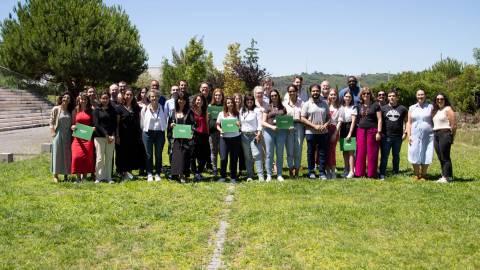Visiting Scholars play a pivotal role in enriching academic environments through their expertise, diverse perspectives, and collaborative contributions. Thanks to the EUTOPIA Alliance, academics of the 10 partner universities can now enjoy a wider array of opportunities to spend a period abroad and collaborate with other prestigious European institutions. By sharing their knowledge and engaging with students and faculty, international scholars can thus contribute to the global exchange of ideas, promoting intellectual growth and innovation in academic communities worldwide.
Among the many Visiting Scholars who Ca’ Foscari has had the pleasure to host over the years, our university has recently welcomed Oriol Amat, Full Professor of Financial Economics and Accounting and former Rector of Pompeu Fabra University in Barcelona - one of the founding partners of EUTOPIA.
Now that his visiting period at the Venice School of Management has come to an end, we’ve asked Professor Amat a few questions about his experience at Ca’ Foscari, as well as his insights on the EUTOPIA network and its future prospects.
What kind of activities did you carry out while at the Department of Management?
During my immersive month at Ca’ Foscari, I engaged in a multifaceted array of activities. My primary focus was on doing groundbreaking research in the field of detecting accounting fraud. Specifically, I delved into identifying red signals that can serve as early indicators, aiding in the prevention and detection of fraud before it escalates. This research is poised to make substantial contributions to the broader understanding of corporate integrity and financial security.
In addition to my research endeavors, I had the privilege of sharing insights through lectures. These sessions, dedicated to the intricate topic of detecting accounting fraud, were designed to empower both PhD students and the esteemed faculty of Ca' Foscari University with practical tools and knowledge. The vibrant city of Venice served as an extraordinary backdrop for these academic pursuits, adding a unique and inspiring dimension to the research and educational activities.
How would you describe your experience at Ca’ Foscari as a visiting scholar?
My experience has been nothing short of exceptional. The university's commitment to academic excellence, coupled with the enchanting atmosphere of Venice, provided an unparalleled environment for intellectual exploration. Beyond the academic realm, I am deeply impressed by the human quality and high professional level of all the individuals I had the pleasure of meeting at Ca' Foscari University. The warmth and collaborative spirit within the academic community were truly remarkable, fostering an environment conducive to impactful research and learning. The support and collaboration extended by the rector, the Dean of the Venice School of Management, and the faculty of accounting, finance, and management have been instrumental in making my stay both academically enriching and personally rewarding.
I extend my heartfelt gratitude to each of them, including Rettrice Tiziana Lippiello, whom I had the pleasure of meeting during my tenure as UPF Rector, as well as Dean Anna Commacchio and Professor Chiara Saccon, for their invaluable assistance and support. The combination of academic excellence, cultural richness, and the welcoming community made this experience truly stand out, and I eagerly anticipate the opportunity to return in the future in connection of the International Advisory Board of the Venice School of Management.
Concerning EUTOPIA, what are, in your opinion, the most interesting opportunities and challenges of the alliance?
EUTOPIA's vision to establish a European University is not merely a dream but a transformative endeavor that holds immense significance in the broader context of building Europe. The alliance's most captivating opportunities lie in its ability to transcend national boundaries, fostering collaboration and knowledge exchange among diverse academic institutions. Joint degrees and collaborative activities within the alliance mark crucial steps toward realizing this shared vision. The experience of learning from and with each other contributes to a more interconnected and vibrant European academic landscape.
However, these opportunities come with their fair share of challenges. Navigating the complex regulations of the ten member universities, compounded by the variations in national regulations, poses formidable hurdles. Yet, with the backing of the European Union and the unwavering commitment of visionary individuals within each institution, these challenges can be overcome, and the dream of a truly integrated European University can be realized.
What would you like to see in the future of EUTOPIA?
Envisioning the future of EUTOPIA, I advocate for a deeper level of collaboration and integration. This involves not only an expansion of joint activities and an increase in the offering of joint degrees but also a stronger emphasis on fostering a culture of academic exchange. Encouraging more scholars to spend meaningful time in partner universities enriches individual academic journeys and plays a pivotal role in building a European University that reflects the collective strength and diversity of the ten member institutions. Such an integrated and collaborative approach is fundamental not only for the academic community but also for the broader ambition of building a more interconnected and united Europe. Achieving the objective of a European University is pivotal, and this endeavor hinges on the decisive leadership of the President of the Eutopia alliance and the rectors of the other universities. Equally significant is the engagement of all the leading figures within the ten universities comprising the alliance, as their collective efforts and vision are integral to the realization of a harmonized and impactful European University. As we embark on this journey, the lessons learned and the experiences shared within EUTOPIA will contribute to the realization of a truly harmonious and impactful European University.
Francesca Favaro
This article was originally published on
Ca’Foscari University's website.

